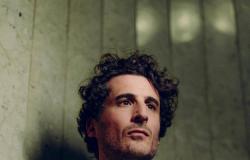Journalist Nicolas Demorand, author of the book testimony Interior night confided on Monday in the Big mouthson his bipolarity. His suicidal thoughts, his diagnosis, his treatment, his profession, he spoke of all the subjects linked to his illness.
“I was ashamed”. Nicolas Demorand repeats it, at the microphone of Big mouthsMonday. The journalist of France Inter was “ashamed” to suffer from bipolarity. But he managed to get out to write a poignant testimony in his book Interior night (ed. Babelio). He explains to be “type 2 bipolar” and tells of all his “mental patient” journey.
“A bipolar is someone whose mood varies in a very strong and very regular way. It is a yoyo,” explains Nicolas Demorand, on RMC. This disease causes people with “euphoria phases” and “depression phases” in people who can be extreme on one side as on the other.
“A perpetual lie”
By thus confiding in his book, the presenter of the morning of France Inter wanted to “claim” his status as bipolar, “mental patient”: “It is not an insult, it is something that I wanted to claim because it is the truth and this truth is impossible to say or to hear Today in France.”
“There is, around mental illness, shame, suspicion,” he said.
Nicolas Demorand speaks of a “very heavy perpetual lie to assume”. His story allowed him to get out of it. “I wrote this book for me first, because something that was having to suffocate me and was formulated,” he says. The journalist sometimes had the impression of being “an imaginary patient”.
Nicolas Demorand facing the GG – 05/05
This bad image of himself that he felt was explained partly by the false ideas conveyed in society on bipolar people. Prejudice on the causes of this disease make patients be responsible for patients, while this is not the case. Several factors, biological, psychological and social can promote its appearance.
A diagnosis after 9 years on average
His book, Nicolas Demorand “also wrote it for the others”. For the others, because patients with bipolarity are diagnosed very late. On average after 9 years, according to Public Health France. He had a diagnosis 8 years ago. He “made no doubt”, but he was “hard to swallow”.
“It is a disease that we do not heal. It is a disease that follows you, harasses you, which dispossesses you of a part of yourself, which involves taking medication for life,” says Nicolas Demorand coldly.
The journalist tried everything for years. He remembers a life before the very complicated diagnosis, accompanied by “pure suffering”. “When you are not diagnosed, we don’t give you the right drugs,” he explains. When he went to the general practitioner, with signs of depression, the latter prescribed products that would encroach his bipolarity, making him even more euphoric in his “high phases”.
These periods of euphoria are difficult to explain and can be difficult to understand for people who are not affected by this disease. Nicolas Demorand speaks of a “feeling of overpower”. “You speak faster and faster, you think quickly, you can have 10,000 projects at the same time. You spend money, you consume alcohol. You have a toxic to excess. This is the manic phase,” describes the journalist.
Suicidal thoughts
The alternation between the high and low phases is often complicated to manage for patients, since they often arrive, very quickly and in large proportions. “Whether in terms of love life or family life, it is extremely difficult since you have a person whose face changes very quickly. You rotate from one phase to another sometimes in a few hours, and at that time, people who live with you say” but who is that person “, says Nicolas Demorand.
“The bipolar talks about him, but he does not see the damage he causes around him.”
Faced with the failure of general practitioners, Nicolas Demorand turned to “psychoanalysts”, who “did not work” either. Medical wanderings at the end of which “we suffer, we are still not treated”. A situation that may have caused suicidal thoughts in him:
“You say to your brain twisted by the pain ‘I’m going to give up in the air to stop suffering’. It is not that I don’t want to live, it is that I can no longer suffer,” he admits.
The solution, for Nicolas Demorand, came from Sainte-Anne hospital, a mental health clinic in Paris. Today, he takes his “handful of daily drugs”, ten, is better, but “continues to have mood variations”.
Radio, its “exoskeleton”
His treatment brings him stability, essential to treat bipolarity, according to him. “Another form of stability,” he adds. Presenter of the morning on Radio France Inter, his job is “the most extreme definition of stability”. Everything is “very framed” and organized “per minute”.
“Radio, I define it as my exoskeleton, as a robot that supports and is there to overcome all my shortcomings and my weaknesses,” he sums up.
Many patients with bipolarity are in the same case. Nursing assistant in nursing homes, Françoise confides, on RMC, that she “also” holds “thanks to her profession and” the responsibilities “that it gives him. Diagnosed at 61, only a year ago, it was “relieved” by the diagnosis. “I understood lots of things that had happened in my life. The problem is to make it understand to those around them. It does not excuse, but that explains,” she confesses.
Jean-Baptiste, too, had to wait for many years before obtaining a diagnosis. “I was diagnosed at 42, two years ago. It changed my life,” he reveals at the GG microphone. A real relief for him, which lived “phases of euphoria and depression ten times a day” in “a very tiring life”.
Measures that are slow to intervene
Today, internationally, one in 150 adults lives with a bipolar disorder. The world Health Organization makes the latter the sixth world cause of disability.
In France, Michel Barnier had declared, in October when he was still Prime Minister, wanting to make “mental health the ‘great national cause 2025′”. But for the moment, this desire is difficult to verify according to Nicolas Demorand: “We are half the year, I do not know if you have seen things, but me not.”
Associations and devices nevertheless exist in France for people with psychological disorders. The system My Psychic support allows anyone, from the age of 3, presenting psychic disorders of light to moderate intensity, to benefit from 12 psychological support sessions per year supported at 60% by health insurance.








